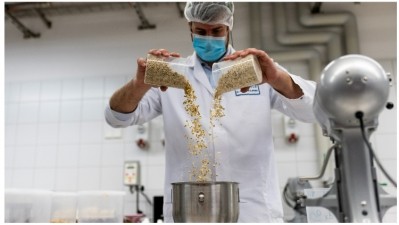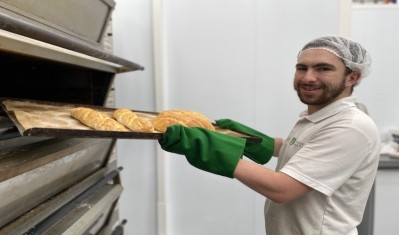Digital feature: long read
Financial services: the cash is out there

There is good news as funding specialists reveal there is money to access and liquidity in the market. From bank loan facilities to grant funding and from private finance to crowdfunding, there are a range of options available to small and large food processors in the current economic climate.
Trefor Griffith, head of consumer industry group and head of food and beverage at Grant Thornton, says pandemic lockdowns had a massive effect on food businesses. Supermarket suppliers generally had positive results, while foodservice suppliers suffered more in the pandemic.
Back in the office
“That has been an issue over the last two years and continues as it is uncertain how that’s going to bottom out with people being back in the office and what that means,” he says.
“Then more recently we have this huge inflationary pressure and trend, which is already impacting on disposable income for consumers and it is very uncertain where that is going to bottom out.”
He expects more push for consolidation in the market, which he describes as ‘fragmented’ as operators look to reduce supply chain costs.
“I also think there is probably going to be more distressed activity than there has been over the past few years,” he predicts.
Increased appetite
“On the positive side we all have to eat. The industry was massively resilient through COVID. It means from a funders’ and M&A [mergers & acquisitions] perspective it increased the appetite.
“About five years ago private equity accounted for around 20% of UK food M&A and last year it was 40%. Private equity sees it as an interesting area.”
Chris McLean, partner within the restructuring and debt advisory team at Grant Thornton agrees. He says before the pandemic there was an excess supply of credit in the market, creating ‘borrower friendly’ conditions, with food manufacturing being one of the most popular.
“Despite the pandemic, conditions have still remained generally borrower friendly,” McLean says. “Food manufacturers, particularly those providing more staples as opposed to the more discretionary spend items, have been popular and continue to attract that type of debt capital.
Funding options
“There are lots of funding options. On the one hand you have the private equity market and on the other at the end that spectrum you have the high street banks and the private credit market, which is massive. It’s an oblique area for a lot of companies.”
Private equity offers a range of funding, from private asset-based lenders, to people providing hybrid capital, such as a mix of debt and equity.
With the labour shortage, processors are increasingly looking at automating production lines and there is funding available for that through asset finance. There’s a variety of capital available whether it’s working capital for issues such as commodity prices or cashflow lending for businesses continuing to perform, McLean confirms.
But manufacturers have to establish credibility with lenders, he advises. He also warns food manufacturing companies to look at environmental, social, and governance criteria standards, as investors are looking to become more socially conscious.
Market strong
Kevin Paget, corporate finance director at Menzies, the accountancy firm, agrees the funding market is strong, due in part to low interest rates.
“From a debt funders point of view there has to be a belief in the businesses’ ability to make those capital and interest payments when they fall due,” he says.
He also highlights asset-based lenders, where capital is lent against equipment providing asset security.
“There are people who lend against capital equipment and you can do a sale and leaseback,” he adds.
Lending without assets
There are funders who will lend to food manufacturers without assets, such as those that lend against maintainable profitability, he adds.
For start-ups, he says crowdfunding has its place but there are other funding options for smaller business if they can prove concept, such as venture capital trusts, early-stage funders or seed investors.
“Ultimately it comes down to why you need the money in the first place and you have to convince the lender,” he adds.
Tax breaks
However, Caroline Milton, partner and head of manufacturing at Menzies, points out that access to cash does not just mean looking for funders. She highlights there are many tax breaks food manufacturers can benefit from, such as owning machinery, research & development and patents.
“If you own the asset and your plant machinery, that’s likely to be more cashflow beneficial than an operating lease where you are just borrowing the machine,” Milton says.
“The reason being there’s a super deduction for tax purposes. You can get up to 130% of tax deduction, which is hugely beneficial, but you have to own the asset in the first place.”
The most crucial thing for any business is to have a clear strategy, she adds. “Have a cashflow business model plan that supports that, so you know where your pinch points are. Without that accessing finance is going to be very difficult.”
Bank funding with Santander and Moo Free
Devon-based vegan chocolate brand Moo Free – winner of the Free-From Manufacturing Company of the Year at the 2022 Food Manufacture Excellence Awards – has funded expansion and rebranding through high street bank Santander UK.
The company was established in 2010 by Andrea and Mike Jessop and now supplies major supermarkets, health food stores and online retailers.
Santander UK provides Moo Free’s day-to-day banking and working capital via an invoice finance facility. It additionally provided the business with £900,000 last year to support a rebrand and product line expansion, which has helped it appeal to new customers.
Ginette Higgs, finance director at Moo Free, says Santander UK has been instrumental in helping it exceed growth plans.
“It has provided us with a combination of services that support our unique cash flow requirements, address our capital commitments and very importantly, achieve our goals,” she says.
Higgs says Moo Free has worked closely with Santander UK to ensure it can navigate challenges like the pandemic successfully, while remaining on track with other financial goals.
“The funding package Santander UK provided enables us to approach the next few years with confidence and meet working capital requirements. As a result, we have seen significant growth in sales year-on-year.”
Andrew Williams, head of food & drink sector, corporate and commercial banking, Santander UK, says: “The company is operating in a high-growth and niche sector and has an exciting future.
“With its ethos of delivering ethical and sustainable products, and its status as a significant employer in its local community, Moo Free is a client we are proud to support.”
Cashflow
Duncan Swift, partner of restructuring and insolvency at Azets, which covers the Solent region agrees having a cashflow model is crucial.
“We would recommend undertaking a 13-week cashflow forecast as that will identify any pinch points in the next three months,” he says.
“This would be a rolling forecast which should be integrated with a 12-month forecast, which might be integrated into a three-year business plan. It’s all about navigating the way through and identifying pinch points before they become a surprise.”
While accessing finance can be a solution to the margin squeeze, he advises suppliers to have conversations with clients and negotiate.
Fear factor
“All too often there’s a fear factor of having such conversations, which is actually misplaced in my view,” he says.
“It’s based upon a type of ignorance that assumes that supermarket buyers will not accept any price increase and also based upon not accepting there is actually a choice for the supplier.”
He adds there’s always funding available to good businesses that have good strong management.
“Private equity and most banks will look at the quality of the management team first and foremost in deciding when to back a business or not, let alone what that business is operating,” Swift adds.
If there’s an enlightened management team with good funding it could be a time to acquire market share from failing competitors, he advises. “There will be winners and losers in this.
“Business owners are not on their own. The sooner they take advice, the more options there are. There’s still a lending and an equity appetite out there to get involved with well-run businesses. The market is awash with liquidity looking for a good home.”
Crowdfunding and grants
He says crowdfunding can be a ‘powerful tool’ if brands have an ‘enthusiastic set of consumers who are willing to back the style and product of the business’.
Debt, banks and private equity are not the only options for food manufacturers. They can look at organisations such as Innovate UK, the national innovation agency and Made Smarter, which can provide help, support and grants to small and medium-sized (SME) enterprises.
Made Smarter operates in different regions across the country. Its tech programme enables small and medium-sized manufacturers to methodically develop a digital plan for tech and skills investment. It deals with businesses with less than 250 employees and with a turnover of less than £40m.
Made Smarter
Alain Dilworth, programme manager for Made Smarter in the North West, says it has dealt with companies ranging from large confectionery manufacturers to small chocolatiers, distilleries to breweries, and packing companies to meat processors.
“Our main aim is to understand what their business is about and have a couple of half-day sessions with them to talk about the business and where their problems are,” he says.
“We will go away and have think about that and come back to them and say in terms of digital technology this would we our recommended starter and that may include grant funding for projects.”
Made Smarter offers grants of up to £20K, although the partner business must input 50% of the costs of any project.
“To make this work they need a bit of a vision,” Dilworth says. “If they are not measuring stuff and performance stuff why not? If you don’t know how you are doing how do you improve on that. At least a decent idea on where the business is going and where sales are going to come from.”
Crowdfunding for One Planet Pizza
Frozen operator One Planet Pizza – a finalist for the Plant-Based Manufacturer of the Year Award at the 2022 Food Manufacture Excellence Awards - has pursued crowdfunding to raise cash.
Founded by father and son Mike and Joe Hill, the company launched in 2016 and claims it ran the UK's first ever crowdfunding campaign for a 100% vegan company. It is now being listed by Asda, initially in 75 stores.
In its most recent Seedrs crowdfunding campaign earlier this year, it raised more than £200,000, hitting its target within a week of public launch on 23 February.
Mike Hill says they obtained 104 investors through crowdfunding. “It was only a small raise, because we had not made a pizza before that,” he adds.
The company has funded itself not only through crowdfunding, but via angel investors through the New Anglia Capital Group.
Hill looked at crowdfunding for a second time earlier this year to further grow the business.
Using Seedrs is not just about the cash, he says. “Seedrs is high-profile, you get a lot of publicity and PR and it’s good from a brand awareness point of view. Even if people don’t invest, at least you’re on the radar.”
He says it can be difficult for start-ups to get debt funding, for example through banks as they often require personal directors guarantees if there’s no history of profits and/or a sound bank balance.
One Planet Pizza is now considering moving to a Series A funding round (the second stage of start-up funding), aiming to raise £2m to £3m in the next six to 12 months.


















